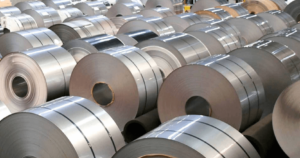
Imports of trucks to Ukraine in January-October 2025 increased by 8% in monetary terms compared to the same period in 2024, reaching $819.5 million, according to statistics from the State Customs Service.
According to the published data, the growth rate of imports of this type of vehicle has slowed down again, reaching 11.6% in the first 10 months compared to the same period in 2024.
In October, truck imports fell by 17% compared to October 2024, to $79.2 million, which is also a quarter less than in September 2025.
The largest number of trucks in 10 months was imported from Poland – $149.6 million (1.3% less than last year), France – $133.2 million (43.3% more) and the United States – $104.2 million (30.4% more).
Imports from all other countries in January-October decreased slightly, amounting to $432.6 million.
At the same time, according to statistics, Ukraine exported only $5.6 million worth of trucks in 10 months, mainly to Turkey (62.4% of exports), Romania (32.4%), and Moldova, while a year earlier, exports were even more insignificant ($2.8 million), mainly to Moldova, Poland, and Kazakhstan.
As reported, in 2024, imports of trucks to Ukraine in monetary terms increased by 30% compared to 2023, to $947.84 million, with most of them imported from Poland (almost 20%).

The volume of tractor imports to Ukraine in January-October 2025 amounted to $703.83 million, which is 6.6% more than in the same period of 2024 ($660.51 million), according to statistics from the State Customs Service.
According to the published statistics, tractors were mainly imported from the US (22% of total imports of this equipment, or $154 million), China (17.2% or $121.1 million), and Germany (16.4% or $115.6 million), while last year Germany was the leader ($101.5 million), China was second ($91.6 million), and the US was third ($86.9 million).
At the same time, imports from other countries in January-October decreased by 17.7% to $313.1 million.
In October this year, tractor imports to Ukraine increased by 9.1% compared to October 2024, to $73.8 million, which is also slightly higher than in September 2025.
Since the beginning of this year, as reported, tractor imports to Ukraine have shown negative dynamics: in January, they were one-third lower than in January 2024, but by the end of the first half of the year, the figures were almost equal to last year’s.
According to statistics from the State Customs Service,
this year, tractors worth $5.1 million were exported in January-October, mainly to Romania (25%), Belgium, and Germany, while last year during this period, exports amounted to $4.6 million, mainly to Moldova (25.6%), the Czech Republic, and Kazakhstan.
As reported, tractor imports to Ukraine in 2024 amounted to almost $784 million, 5.6% less than a year earlier, while exports amounted to $5.44 million compared to $5.74 million.

Global demand for steel in 2025 will remain at the previous year’s level — about 1.748 billion tons, after a 1.6% decline in 2024. These figures are given in the short-term forecast of the World Steel Association (Worldsteel) — Short Range Outlook (SRO).
In 2026, according to experts, demand will grow by 1.3% to 1.772 billion tons, driven by recovery in Europe, India, and the rapidly developing countries of Asia, the Middle East, and Africa.
According to Worldsteel’s forecast, in the CIS countries, including Ukraine, demand for steel will decline by 5.2% in 2025, to 56.1 million tons, and by another 1.7% in 2026, to 55.2 million tons.
At the same time, India will retain its status as the world’s fastest-growing steel market, with growth of around 9% annually in 2025-2026. Already next year, steel consumption in India will be almost 75 million tons higher than in 2020.
In developing countries (excluding China), demand for steel will increase by 3.4% in 2025 and by 4.7% in 2026, driven by active economic development in ASEAN countries, as well as in Saudi Arabia and Egypt.
In Africa, steel consumption is growing by an average of 5.5% annually, reaching 41 million tons in 2025 — the highest level in the last decade. Growth is driven by investments in construction and improved macroeconomic indicators.
Andriy Ozeychuk, Chairman of the Board of Directors of the Ukrainian Steel Construction Center and Director of Rauta, commented on the market situation and prospects for the Ukrainian steel sector.
“The Ukrainian steel market in 2025–2026 will be shaped by the recovery of domestic demand in construction and machine building, as well as the growth of exports of metal structures to the EU. We predict that demand for steel in Ukraine may grow by 6-8% in 2026 due to infrastructure and industrial recovery projects,” Ozeychuk said.
According to him, the steel construction sector will be the driver of this growth:
“The use of metal structures will accelerate the restoration of logistics, industrial, and infrastructure facilities.”
Ozeychuk also stressed that the launch of joint programs with European partners in the field of “green” metallurgy, where Ukraine already has its first pilot initiatives for the production of steel with a low carbon footprint, could give the industry an additional boost.
According to the forecast, demand for steel in the EU+UK region will increase by 1.3% in 2025 and by 3.2% in 2026. This reflects the impact of increased investment in infrastructure and defense amid lower inflation and improved household incomes.
In the US, Worldsteel expects steel consumption to increase by 1.8% in both 2025 and 2026. The main drivers of growth will be government spending on infrastructure, a revival in housing construction, and private investment.
In China, steel demand will continue to decline, by approximately 2% in 2025, due to the prolonged downturn in the real estate market. In 2026, the rate of decline will slow to 1% as the construction sector is expected to bottom out.
Worldsteel warns that a more challenging global trade environment and financial pressure on local authorities could further limit infrastructure investment and reduce demand.
According to Alfonso Hidalgo de Calcerrada, chief economist of the Spanish Steel Manufacturers Association (UNESID) and chairman of the Worldsteel Economic Committee, the organization is “cautiously optimistic” about the market outlook:
“Despite trade disputes and uncertainty, we believe that global steel demand will bottom out in 2025 and show moderate growth in 2026,” the expert said.
He added that this will be facilitated by the resilience of the global economy, growth in infrastructure investment, and easing financial conditions. At the same time, the sector continues to be pressured by high costs, trade barriers, and geopolitical risks.
Worldsteel’s forecast emphasizes that the decline in demand in China is offset by strong growth in India and developing countries, where a new center of global steel production is emerging.
In addition, the protective measures introduced by the European Union — reducing duty-free import quotas and increasing customs duties to 50% — may change the balance between EU producers and exporters from Asia and Eastern Europe.
For more information on the largest steel producers and global industry trends, see the Experts Club video analysis review available on YouTube: Experts Club — Leaders of the global steel industry 1990–2024
CHINA, EU, EXPERTS CLUB, global economy, INDIA, OZEYCHUK, RAUTA, USA, World Steel, WORLDSTEEL

Imports of trucks to Ukraine in January-September 2025 grew by 11.6% in monetary terms compared to the same period in 2024, reaching $740.18 million, according to statistics from the State Customs Service.
According to the published data, the growth rate of imports of this type of vehicle accelerated, in particular, in the first half of the year, it amounted to 6.2% compared to the same period in 2024.
In September, truck imports increased by 32.7% compared to September 2024, reaching $105.8 million.
Most of the trucks were imported from Poland in the first nine months, accounting for $141.12 million (19% of the total), followed by France with $115 million (15.5%) and the United States with $102.4 million (13.8%).
A year ago, the top three truck supplier countries were the same, with Poland importing $137.8 million, France $78.3 million, and the US $66.2 million.
Imports from all other countries increased slightly in January-September, amounting to $381.7 million.
At the same time, according to statistics, Ukraine exported only $4.4 million worth of trucks in nine months, mainly to Turkey (52.7% of exports), Romania (41%), and Moldova, while a year earlier there were even more insignificant export deliveries ($2.4 million), mainly to Moldova, Poland, and Kazakhstan.
As reported, in 2024, imports of trucks to Ukraine in monetary terms increased by 30% compared to 2023, to $947.84 million, with most of them imported from Poland (almost 20%).

The volume of tractor imports to Ukraine in January-September 2025 amounted to $629.41 million, which is 6.2% more than in the same period of 2024 ($582.56 million), according to statistics from the State Customs Service. According to the published statistics, tractors were mainly imported from the US (20.7% of total imports of this equipment, or $130.2 million), China (almost 18% or $113 million), and Germany (16.7% or $105.3 million), whereas a year ago it was Germany (almost $90 million), China ($82.3 million), and the Netherlands ($78 million).
At the same time, imports from other countries in January-September decreased by 17.9% to $280.9 million, and their share in the total volume of tractor imports decreased to 44.6% from 57.8%.
In September this year, tractor imports to Ukraine increased by 23.6% compared to September 2024, to $73.7 million.
Since the beginning of this year, as reported, tractor imports to Ukraine have shown negative dynamics: in January, they were down by a third compared to January 2024, but by the end of the first half of the year, the figures were almost on par with last year’s.
According to statistics from the State Customs Service, $4.5 million worth of tractors were exported in January-September this year, mainly to Romania (28%), Belgium, and Germany, while last year’s exports for the same period amounted to $4.1 million, mainly to Moldova (28%), Kazakhstan, and the Czech Republic.
As reported, tractor imports to Ukraine in 2024 amounted to almost $784 million, 5.6% less than a year earlier, while exports amounted to $5.44 million compared to $5.74 million.

Unrealized exchange commodities, growing losses in dry milk and butter production, and falling butter prices in Europe and worldwide are holding back the growth of raw milk prices in Ukraine, according to the Association of Milk Producers (AMP).
The industry association noted that the average purchase price of extra-grade milk as of October 6 was UAH 17.45/kg excluding VAT, which is UAH 0.1 more than in the previous month, Prices for premium milk (UAH 17.15/kg excluding VAT) and first-grade milk (UAH 16.80/kg excluding VAT) remained unchanged.
“Prices also remained stable compared to the results of monitoring in the second half of September. Compared to the same period last year, the price of extra grade milk decreased by 25 kopecks,” experts noted.
According to AVM analyst Georgiy Kukhaleishvili, many factors are holding back the growth of raw milk prices in Ukraine. Currently, the supply of exchange goods on the domestic market exceeds demand. Milk processing enterprises have been working at full capacity since mid-August after the suspension of milk exports to the EU following the exhaustion of quotas. At the same time, demand on the domestic market remains low due to a decrease in the number of consumers and a reduction in the purchasing power of the population. Sales of dairy products in supermarkets are growing only when promotional discounts are offered. Warehouses in Ukraine are almost completely filled with exchange goods, which puts pressure on milk prices.
According to the ABM, the situation with butter in the EU is indicative, as it has fallen in price by 24% over the past two months due to the arrival of American butter on the European market at a price of EUR 5,000/ton. In such conditions, European traders are not interested in buying Ukrainian butter, which costs more than American butter. The increase in electricity costs affects the growth of the cost of Ukrainian products and makes it difficult to compete with Americans in the European market, analysts explain.
In Ukraine, in the second half of October, there is a possibility of a maximum price reduction for extra-grade and higher-grade raw milk due to the growing unprofitability of dry milk and butter production at milk processing enterprises and a decline in world prices for butter, they predict.
“However, on October 13, new quotas for the export of dairy products to the EU for Ukrainian companies are expected to be signed. Quotas for butter have increased from 5,000 tons to 7,000 tons, as well as for dry milk. Dairy exports to the EU are expected to resume on October 28, after the quotas come into force in 15 days, which may curb the fall in raw milk prices in Ukraine,” the ABM notes.